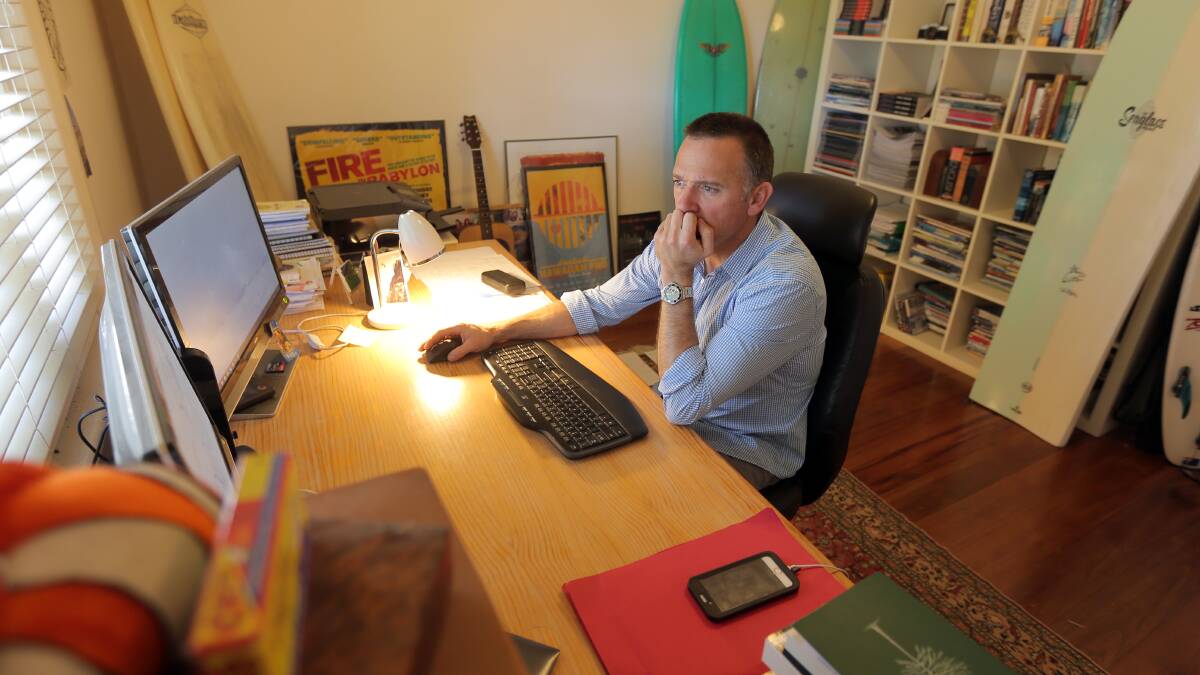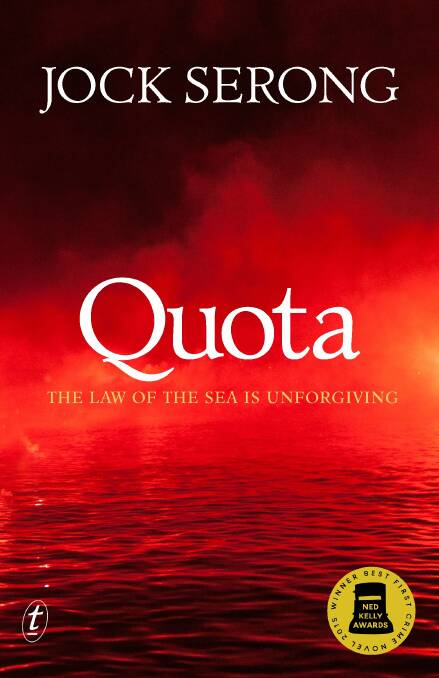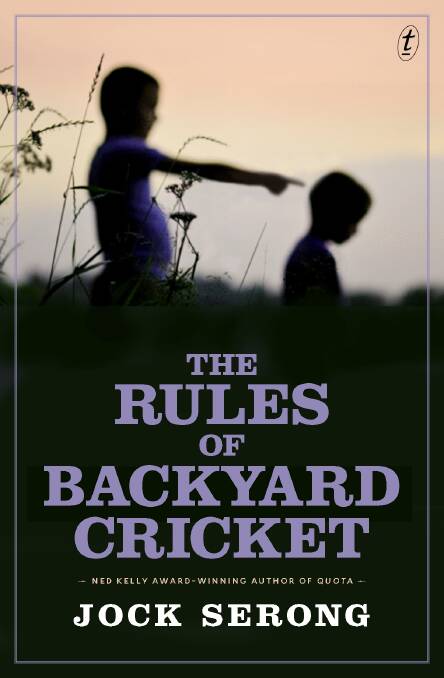BY his own description, Jock Serong is “a pretty conventional person”.
Subscribe now for unlimited access.
$0/
(min cost $0)
or signup to continue reading

He surprised himself when he finished high school and got an offer to study law, and rather than question whether it was what he really wanted to do with his life, he accepted the offer because it seemed like the conventional thing to do.
“I’d been sick towards the end of school so I didn’t expect to do very well (but) I got an offer to law school,” he said.
“I thought ‘law’s a good career, I should go and do that’.”
He got his “lawyer ticket”, spent a couple of “thoroughly miserable” years stuck “in Melbourne in a glass box in a tower” before moving to Port Fairy for a couple of years.
“I got a map out and thought ‘I want to be on the coast and want to be in a small town’,” he said.
Work opportunities then took him to Western Australia and back to Melbourne before returning to Port Fairy to raise a family in 2004.
Nine years later, Serong was a successful criminal lawyer and partner at a law firm when he decided to chuck it in and try his hand at becoming a writer. Onlookers must have been puzzled – this was far from the “conventional” thing to do.
But for Serong, the career change from lawyer to author was an attempt to scratch an itch that had been there for sometime and slowly growing in intensity.
“When I was at school I used to write fiction and loved writing fiction,” he said.
“But I was always very embarrassed about it.”
At age 37 he filed an article for a surfing magazine, which led to more articles. Around the same time, he spotted a notice at the Port Fairy supermarket advertising a writer’s group.
Serong joined and began writing short stories, exercising muscles he hadn’t used since school.

“After a few months of that I started putting the bits and pieces together and I realised I was essentially telling the same story with different characters and different settings,” he said.
“I thought ‘if I linked these together, made these the same person, there’s a novel in it’. That was a breakthrough moment. It felt audacious at the time.
“It’s difficult to acknowledge to yourself that you could think like an artist or be an artist … but once you give yourself the leeway it opens up other ways of thinking.”
That novel would become Quota – the award-winning book that would lead to him making a massive career change.
“It was a very gradual thing,” Serong said of him quitting law.
“It was quite difficult because I was partner at the firm and work at the time was quite demanding. We had four small children and I was writing quite a bit of feature stuff in surf media. I was writing a novel at night and weekends.
“All these things were building up and I had a feeling I wasn’t doing any of them very well.
“Something had to give and once I acknowledged that something had to give, it was just a question of what.”
He said there was no “lightbulb moment” that triggered the switch, but two things happened that pushed Serong to make a decision.
One was being asked to edit a new magazine called Great Ocean Quarterly (which is now sadly defunct) and the other was being offered a contract to publish Quota.
With the support and encouragement of his wife Lilly, Serong handed in his resignation and began the piecemeal existence of a writer.
He wrote articles for surf magazines, papers and websites, picked up some teaching and editing work, and wrote a screenplay that was bought by a production company.
“The big thing you let go of is certainty,” he said.
“If you consider yourself a writer as a vocation, part of what you want to do is be versatile and try your hand at different things. It’s really varied – that’s the appeal and the curse.
“I’ve been through all sorts of angst about whether it was the right thing to do and how the hell are we going to get through. But I believe that once you decide something significant about your life, there’s no longer a right or wrong decision – just a decision and you have to carry it out and try not to do too much looking back.”
Thankfully Quota was a moderate success – “it did well enough, and then I was confident I was on the right track,” Serong said.

It’s about a city lawyer being disorientated in a country town – something Serong admits is “probably autobiographical” – as the lawyer tries get to the truth behind a murder cover-up. Quota won the Australian Crime Writers Association’s Award for best debut novel.
“I was seriously surprised by the award,” he said.
“I know people say that all the time but it shocked the hell out of me. The morning after … I started thinking about things differently – that at last there was a reward at the end of the struggle.
“Winning an award changes some things but not everything. It meant (publishing house) Text were able to re-issue the book with the little gong on the front (and) it's often mentioned as a publicity line or it’s a line in the reviews for the second book.
“Realistically, for the reading public, they pick up a book and if it looks interesting they’ll buy it. But awards are really important for the industry and writers – it puts someone like me in the position where I’ve got a peg to climb on. Unlike other industries, there’s not a lot of validation for what you do other than hoping your sales are good. With everything you do it puts a little bit of scaffold under yourself so you can do the next thing.”
The next thing for Serong is his second novel, The Rules Of Backyard Cricket. It was released earlier this week and tells of Darren Keefe, “an Australian sporting star of the bad-boy variety”, who winds up bound and gagged in the boot of a car, his life flashing before his eyes.

The author said that on one hand the book is about “men and Australiana and sport, but on the other is … about family and brothers and in a subtle way it’s a story about women”.
“I wanted to think critically about men and sport and how those men behave in the public arena, to look at how it is that happens and why as a society do we encourage it,” Serong said.
“I can think of a few incidents I’ve seen in the media – and I have to be careful not to name anyone – but you see these incidents and then you can’t believe that person, that they’ve done that, and now they’re propped up in a suit as a commentator.
“The media’s ability to rehabilitate someone whose disgraced themselves amazes me. I was interested in that process.
“But The Rules Of Backyard Cricket started with the title – I liked that as a title – and I wondered what that story was.
“And at the time I started driving the Geelong road a lot and I started thinking about what it would be like if you were in the boot … on a death sentence – it would be a really obvious opportunity to reflect on a lifetime.
“Then it was a process of thinking about the three things – the title of The Rules Of Backyard Cricket and a doomed person in a boot, and somewhere in there sporting celebrities, and it all came together as a story.”
The release of The Rules Of Backyard Cricket is exciting for the author but after so much waiting there is “a curious sense of anticlimax”, he said.
“You wait for it to come out for a year and you start hanging out for that date, then the date arrives and it’s just another day,” Serong said.
While there will be plenty of public events and appearances to promote the new book, Serong’s mind is already on his next one.
“It’s moving away from crime – it’s a move into something more political,” he said.
“It looks at asylum seekers in a fairly unusual way. One of the reasons I’m doing it is the asylum seeker debate in Australia has been thrashed out in the media for years and people have dug their trenches and good journalism is failing to move people.
“I think what happens next is fiction gets involved – books and films – in working away on changing people’s opinions.”
While his first two books have been very different from each other, they’ve shared a criminal element – something Serong plans to leave behind on book three.
“When I wrote Quota, I didn’t think of it as a crime book, but I guess it’s a natural instinct to hang on to things you know,” he said, referring to his legal background.
“And The Rules Of Backyard Cricket draws on things I remember from my childhood.
“But I don’t consider myself to be a genre writer. And Text have never put any pressure on me (to only write crime).”
His screenplay The Ship Thieves is also floating around the film industry, and the film rights to Quota have already been sold.
In the meantime, Serong will be at the Ex Libris Festival of Words in Port Fairy on September 10 to officially launch The Rules Of Backyard Cricket as well as host a panel featuring Graeme Simsion and Anne Buist.

